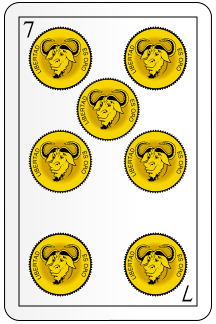Escoba
Escoba is a traditional card game originating from Spain and popular in various Spanish-speaking countries. It is a game typically played with a Spanish deck of 40 cards, which excludes the 8s and 9s found in other decks. The game can be played by two or more players, aiming to capture cards on the table to score points based on certain combinations. The name Escoba translates to broom in English, symbolizing the action of "sweeping" the table clean of cards through skillful play.
Gameplay[edit | edit source]
The objective of Escoba is to capture cards from the table to score points through various combinations, with a particular focus on summing cards to a total value of 15. Players are dealt three cards each, and four cards are placed face up on the table. If a player cannot make a move, they must drop one of their cards onto the table, which can then be captured by other players. The game proceeds in turns, with each player trying to capture as many cards as possible to achieve a set of specific scoring criteria.
Scoring[edit | edit source]
Points in Escoba are awarded for:
- Having the most cards.
- Capturing the most cards of the gold suit.
- The Sette Bello - the seven of coins, which is the most valuable card.
- Creating an Escoba - sweeping the table clean of cards by exactly matching a card's value to the sum of the cards on the table.
Variations[edit | edit source]
There are several variations of Escoba, depending on the region. These can include differences in scoring, the number of players, and even the deck used. Some popular variations include Escoba del 15, which is the most widely played version, and Escoba de 30, where the objective is to sum cards to a total value of 30.
Strategy[edit | edit source]
Strategic play in Escoba involves memory, calculation, and anticipation. Players must remember which cards have been played and predict what their opponents hold. Strategic discarding can also play a crucial role, as it can force opponents to make moves that are advantageous to the player.
Cultural Significance[edit | edit source]
Escoba holds a significant place in the cultural traditions of many Spanish-speaking countries. It is more than just a pastime; it is a social activity that brings families and friends together. The game is often taught from one generation to the next, preserving its cultural heritage.
Search WikiMD
Ad.Tired of being Overweight? Try W8MD's physician weight loss program.
Semaglutide (Ozempic / Wegovy and Tirzepatide (Mounjaro / Zepbound) available.
Advertise on WikiMD
|
WikiMD's Wellness Encyclopedia |
| Let Food Be Thy Medicine Medicine Thy Food - Hippocrates |
Translate this page: - East Asian
中文,
日本,
한국어,
South Asian
हिन्दी,
தமிழ்,
తెలుగు,
Urdu,
ಕನ್ನಡ,
Southeast Asian
Indonesian,
Vietnamese,
Thai,
မြန်မာဘာသာ,
বাংলা
European
español,
Deutsch,
français,
Greek,
português do Brasil,
polski,
română,
русский,
Nederlands,
norsk,
svenska,
suomi,
Italian
Middle Eastern & African
عربى,
Turkish,
Persian,
Hebrew,
Afrikaans,
isiZulu,
Kiswahili,
Other
Bulgarian,
Hungarian,
Czech,
Swedish,
മലയാളം,
मराठी,
ਪੰਜਾਬੀ,
ગુજરાતી,
Portuguese,
Ukrainian
Medical Disclaimer: WikiMD is not a substitute for professional medical advice. The information on WikiMD is provided as an information resource only, may be incorrect, outdated or misleading, and is not to be used or relied on for any diagnostic or treatment purposes. Please consult your health care provider before making any healthcare decisions or for guidance about a specific medical condition. WikiMD expressly disclaims responsibility, and shall have no liability, for any damages, loss, injury, or liability whatsoever suffered as a result of your reliance on the information contained in this site. By visiting this site you agree to the foregoing terms and conditions, which may from time to time be changed or supplemented by WikiMD. If you do not agree to the foregoing terms and conditions, you should not enter or use this site. See full disclaimer.
Credits:Most images are courtesy of Wikimedia commons, and templates Wikipedia, licensed under CC BY SA or similar.
Contributors: Prab R. Tumpati, MD


